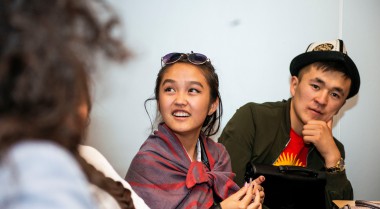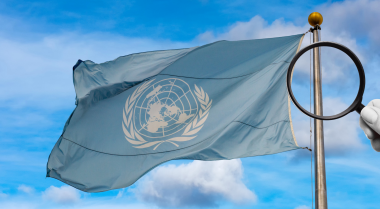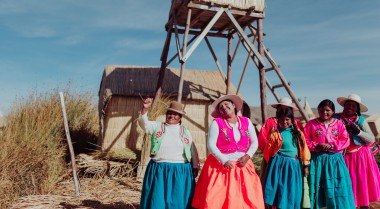
Funding Peace Locally
We all know that conflict and war are persistent in the world. Yet, only some of us experience it first hand. Only some of us are close enough to directly take a stand against it. Those few are empowered and emboldened by all of us who desire peace. Those few powerful actors - local peacebuilders - have the critical expertise and knowledge of conflict drivers and resilience factors, at the local level.
At GPPAC, we successfully bring local peacebuilders’ agency into the global policy space. For example, the 2020 dual UN Resolutions on Peacebuilding and Sustaining Peace (A/RES/75/201-S/RES/2558) recognise that “that peace is more sustainable when peacebuilding efforts are locally owned, led and implemented.” Also, the 2020 launch of the Community Engagement Guidelines (CEGs) provides an incentive for UN actors operating in the field to effectively engage with and harness the potential of local civil society organisations.
However, global support to meaningfully and systematically implement local peacebuilding is still missing.
To conduct their work, local peacebuilders rely on existing funding models. However, these funding systems are not designed to translate policy commitments to local peacebuilding into action on the ground. The current aid system is set up in a way that sees billions of dollars awarded every year to global intermediary organisations and entities (like INGOs and global or in-country pooled funds) with robust due diligence capacities in place. Yet, these intermediary organisations are often not well-equipped to design and implement effective solutions for local problems. Such financing for peacebuilding system is inefficient and ultimately undermines the sustainable impact of donor resources.
Peacebuilding and Sustaining Peace must be locally-led and globally-supported.
At GPPAC, we are convinced the time is now to jointly find actionable solutions to put local peacebuilders at the helm and make peace sustainable.
Together with the Radical Flexibility Fund and with the support of the Dutch Knowledge Platform Security & Rule of Law, we have brought together a group of local peacebuilders with a group of international finance experts from within and outside of the peacebuilding sector, thereby facilitating an exchange of experiences and ideas between two constituencies that normally do not meet.
They helped us think about what donors and intermediaries could change about how they distribute their financing for peacebuilding to strengthen the position of local peacebuilders. The result of these consultations is a paper that outlines three basic principles that donors and intermediaries can adopt to ensure effective and sustainable peacebuilding.
Our financing for peacebuilding work currently encompasses the following areas of work:
1. Designing Effective Financing Mechanisms for Local Peacebuilders
In partnership with the Dag Hammarskjold Foundation, we created a safe learning space for the donor community, including the major global funds’ managers, donor countries, and international financial institutions, to explore opportunities and challenges towards ensuring accessible funding for local peacebuilding action. The result is a working paper that takes note of the challenges faced by the international donor community to directly support local peacebuilders and proposes avenues to advance effective financing for local peacebuilding while taking the challenges into consideration. Read the full paper here >>
Part of (re)designing effective mechanisms include rethinking the role of intermediaries. Given that it is unlikely that the role of the intermediary will disappear, we work with the Radical Flexibility Fund to think about the role of the intermediary and how this role can better support local peacebuilding action and ensure local ownership. Currently, we are developing a working paper that focuses on key elements donors and fund managers should consider when seeking to utilize and design more innovative approaches to financing local peacebuilding.
2. Practising what we Preach: Financing for Youth by Youth
GPPAC challenges the traditional relationships between the grantor and young, local peacebuilders. Beyond providing support for innovative ideas of young peacebuilders across the network by alleviating administrative hurdles, our Youth, Peace and Security funding scheme was uniquely designed based on a Youth-by-Youth Approach. This means that young people were in the lead of designing and allocating the small grants to their peers. The adopted approach prioritises the ownership of youth and amplifies the capacities of the recipients. It is rooted in three key principles: participatory grantmaking, authentic partnership, and holistic support provision. Find out more on our For Youth and By Youth approach to financing youth-led peacebuilding.
3. Advancing Feminist Solutions for more Impactful Financing
It is a known fact that women all around the world are at the forefront of building and sustaining peace in their communities. Quality financing of their work is a prerequisite to their success and impact. That is why prior to the April 2022 High Level Meeting on Financing for Peacebuilding, we have developed a background paper together with our colleagues at GNWP, ICAN, Kvinna till Kvinna, and WILPF. The background paper focuses on six structural barriers faced by diverse women peacebuilders in accessing funds and presents concrete, innovative, and practical solutions to address these barriers. Read the full paper here >>>
4. Influencing Global Policy on Financing for Peacebuilding
While we are focusing on concrete steps and practical solutions, we engage with policymakers and donors to reconceptualise the current donorship structures. We continuously work to strengthen global efforts to ensure adequate, predictable, and sustained financing for peacebuilding. This commitment stems from the findings of the 2020 Peacebuilding Architecture Review and the breadth of experiences within the GPPAC Network. Find a full overview of our engagement at the global policy level here >>>
Follow us on Twitter #Financing4Peacebuilding and #FundLocalPeacebuilding to stay up to date.
If you have any ideas to share, please reach out to Marina Kumkova from our UN Office at un.liaison@gppac.net regarding policy engagement and Marie-Laure Poire at GPPAC’s Global Advocacy Team at ml.poire@gppac.net regarding partnerships and networking.




